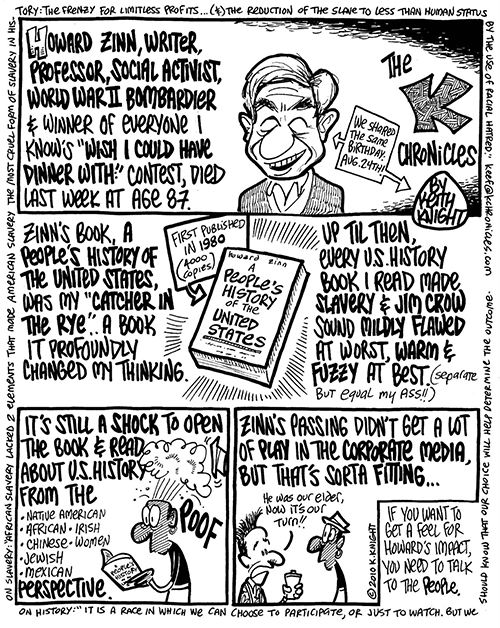When you play “arguing with anti-leftist”* Bingo, you should always have a square that anticipates their view that, because you were educated in public schools, you are brainwashed by the liberal/Cultural Marxist agenda.
It’s hard not to kind of see their point. Teachers are generally left-leaning (although I’m fairly certain my 8th grade history teacher was alt-right after I recall entire lesson plans where he justified the treatment of Native Americans because they were so “savage” to settlers), academia is generally left-leaning and they write the textbooks, and tolerance - something they try to teach you in school - is almost a left-leaning concept by default (another square in the bingo game could be the phrase “and I thought liberals were the tolerant ones”).
At any rate, you always tend to think you’re not brainwashed. You were taught a pretty accurate history in high school and college. I’ll admit that I thought this. Then I read Howard Zinn’s A People’s History of the United States.
It almost seems incredibly cliche’ to say that a book has transformed your worldview as an adult, especially an adult that believes himself in the welterweight category of heavy readers, but there is no other way to describe reading A People’s History.
Zinn takes his reader from the beginning of this nation to 2001, just after 9/11. What makes the historical perspective he documents interesting can be summed up well in this quote from the book:
“All those histories of this country centered on the Founding Fathers and the Presidents weigh oppressively on the capacity of the ordinary citizens to act. They suggest that in times of crisis we must look to someone to save us: in the Revolutionary crisis, the Founding Fathers; in the slavery crisis, Lincoln; in the Depression, Roosevelt; in Vietnam, Carter. And that between occasional crises everything is alright, and it is sufficient for us to be restored to that normal state. They teach us that the supreme act of citizenship is to choose moong saviors, by going into a voting booth every four years to choose between two white and well-off Anglo-Saxon males of inoffensive personality and orthodox opinions”
Zinn introduces you to a whole range of historical figures who were ordinary American citizens that organized movements. Zinn zeros in on the aspects of history left out of public school lesson plans, namely that every ounce of progress America made towards a thriving democracy was driven by people whose only power was a collective one.
It seems repetitive and boring and obvious to talk about the ramifications of this book today. And it would be if all you talked about was how America used to be really oppressive and we seem dangerously close to getting back to some of those points. But if you take the key lesson of this book it is possibly one of the more important things you could possibly read in Trump’s America.
Why? Because this history squares everyday citizens as the chief catalysts for change. It does not demonstrate a resistance parade of late night TV shows and personalities, the liberal celebrity brigade, or a diverse corporate boardroom. Your favorite people in power are not giving any more of it to you no matter how much they hate the other people in power. This includes politicians, even good ones, so stop fetishizing your vote and get involved in a campaign to end gerrymandering or something!
If you’re feeling helpless and burned out in the face of Trump and corporate Democrats and the limits of electoral politics I couldn’t recommend a more empowering book.
__________________
*An anti-leftist is a term I am trying to popularize. It’s basically someone who holds almost incoherent and highly contradictory conservative views simply to ‘trigger the libs’. Things like hating big government but loving Trump and the wall, hating crony capitalism but advocating charter schools, supporting the troops but being prepared to shoot them should they come for our guns, distrusting Muslims but valuing Trump’s deals with Saudi Arabia, loving what Trump or Reagan or Bush did/does but hating those exact same things when Clinton, Carter, or Obama did them.

